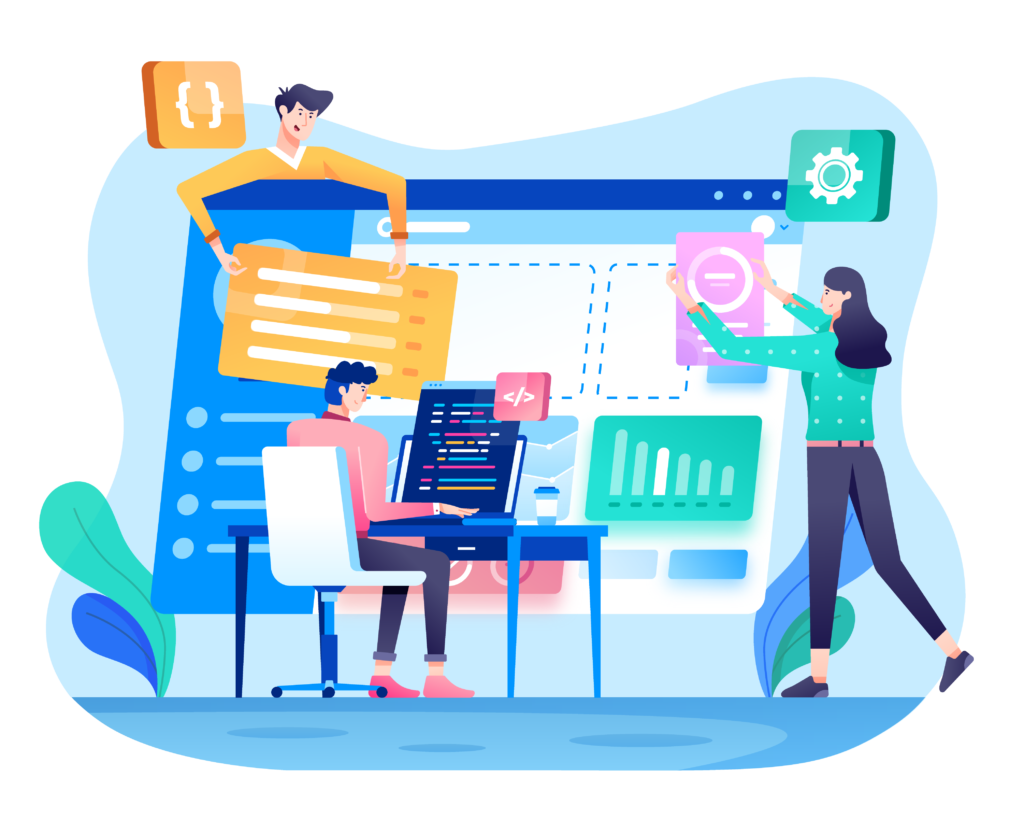With e-Learning platforms, students or trainees have the freedom to access their courses and learning materials at any time and from any place, allowing them to study at their own pace.
Lines of code written
Uptime for application we develop
Clients
Frameworks Implemented
1. Introduction
Training and coaching institutes have traditionally relied on physical classrooms and in-person interactions to deliver their services. However, with the advancement of technology, there is now a more efficient and effective way to revolutionize these institutes. By utilizing e-learning platforms and apps, institutes can enhance their training programs, provide a more interactive and personalized learning experience, and reach a wider audience. In this article, we will delve into the benefits of incorporating Learning Management Systems (LMS), e-learning platforms, and mobile and web apps into training and coaching institutes, and how these tools can revolutionize the way education is delivered.
2. The benefits of e-Learning platforms for training and coaching institutes
In today’s digital era, e-Learning platforms have proven to be a game-changer for training and coaching institutes. These platforms offer a plethora of benefits that can significantly enhance the education delivery process. One of the major advantages is the ability to provide a more flexible learning experience. With e-Learning platforms, students have the freedom to access their courses and learning materials at any time and from any place, allowing them to study at their own pace.
E-Learning platforms offer a wide variety of interactive features, such as multimedia content, quizzes, and discussion forums, which make the learning process more engaging and enjoyable for students. These platforms also enable trainers and coaches to track students’ progress and provide personalized feedback, allowing for a more tailored learning experience.
Additionally, e-Learning platforms eliminate geographical barriers, enabling institutes to reach a wider audience and expand their reach beyond their local communities. This not only helps institutes increase their revenue but also creates opportunities for students who may not have access to quality education in their area.
In conclusion, e-Learning platforms offer numerous benefits for training and coaching institutes. By incorporating these platforms into their programs, institutes can provide a flexible and interactive learning experience, reach a wider audience, and ultimately revolutionize the way education is delivered. Stay tuned for the next section, where we will explore the advantages of mobile and web apps in the training and coaching industry.
3. Streamlining institute operations with e-Learning apps
Now that we have discussed the advantages of e-Learning platforms, let’s delve into the benefits of incorporating e-Learning apps into training and coaching institutes.
E-Learning apps are specifically designed to optimize the learning experience on mobile devices. With the increasing use of smartphones and tablets, these apps provide a convenient and accessible way for students to engage with their courses. By offering a seamless transition between devices, e-Learning apps allow students to continue their learning journey even when they are on the go.
Not only do e-Learning apps promote flexibility and convenience, but they also streamline institute operations. These apps can automate administrative tasks such as enrollment, fee payment, and course material distribution. This reduces the burden on the institute staff, allowing them to focus on delivering quality education and supporting students.
Additionally, e-Learning apps often come equipped with communication tools, such as live chat and discussion boards, which facilitate instant interaction between students and trainers/coaches. This fosters a sense of community and encourages collaborative learning.
In conclusion, e-Learning apps offer training and coaching institutes an efficient way to deliver education and optimize institute operations. Stay tuned for the next section, where we will explore the impact of artificial intelligence in revolutionizing the training and coaching industry.
4. Personalized learning experiences for students
One of the key benefits of incorporating e-Learning apps into training and coaching institutes is the ability to provide personalized learning experiences for students. These apps utilize artificial intelligence algorithms to analyze individual student data and deliver customized content and feedback.
By understanding each student’s learning style, preferences, and pace, e-Learning apps can tailor their courses to meet the specific needs of each student. This promotes greater engagement and comprehension, as students can learn at their own pace and focus on areas where they need more practice.
Furthermore, personalized learning experiences can boost student motivation and confidence. When students feel that their education is tailored to their individual needs, they are more likely to feel supported and empowered in their learning journey.
Incorporating e-Learning apps into training and coaching institutes not only revolutionizes the way education is delivered but also enhances students’ overall learning experience. Stay tuned for the next section, where we will discuss the role of virtual reality in transforming training and coaching institutes.
5. Enhancing collaboration and communication among trainers and trainees
In addition to providing personalized learning experiences, incorporating e-Learning platforms and apps into training and coaching institutes also enhances collaboration and communication among trainers and trainees.
These platforms facilitate seamless communication channels, allowing trainers to easily share resources, assignments, and important updates with their trainees. Through discussion forums and virtual classrooms, trainees can engage in meaningful discussions, ask questions, and seek clarifications from trainers and fellow trainees.
By leveraging the power of technology, e-Learning platforms enable real-time collaboration on projects and assignments, regardless of geographical locations. This fosters teamwork and encourages trainees to work together, exchange ideas, and learn from each other’s perspectives.
Furthermore, trainers can track trainees’ progress, provide timely feedback, and monitor their performance through the platform’s analytics tools. This allows for targeted support and intervention, ensuring trainees stay on track and achieve their learning objectives.
By revolutionizing collaboration and communication, e-Learning platforms and apps create a dynamic and interactive learning environment that promotes not only individual growth but also collective learning and development. The next section will delve into the benefits of virtual reality in transforming training and coaching institutes. Stay tuned!
6. Tracking and assessing performance with e-Learning platforms
In the fast-paced world of training and coaching institutes, it is crucial to have accurate and timely information about the performance of trainees. Traditional methods of tracking and assessing performance can be time-consuming and prone to errors. However, with the advent of e-Learning platforms, this process has become streamlined and efficient.
One of the major advantages of using e-Learning platforms is the ability to track trainees’ progress easily. Trainers can access comprehensive reports that provide insights into trainees’ engagement levels, completion rates, and performance in assessments. This data allows trainers to identify areas of strengths and weaknesses, enabling them to tailor their coaching and support accordingly.
Moreover, e-Learning platforms offer built-in analytics tools that provide in-depth analysis of trainees’ performance. These tools enable trainers to gain valuable insights into individual trainees’ learning patterns, preferred learning styles, and areas requiring additional focus. With this information at hand, trainers can design personalized learning plans and interventions, ensuring every trainee gets the support they need to succeed.
Additionally, e-Learning platforms provide real-time feedback mechanisms. Trainers can provide immediate feedback on assignments and assessments, giving trainees the opportunity to make corrections and improvements promptly. This timely feedback helps trainees stay motivated and engaged in their learning journey.
In conclusion, e-Learning platforms revolutionize the tracking and assessing process in training and coaching institutes. With accurate and insightful data, trainers can make data-driven decisions to optimize the learning experience for their trainees.
7. Conclusion: Embracing the future of education with e-Learning technology
As we have discussed in the previous section, e-Learning platforms have transformed the way training and coaching institutes track and assess trainees’ performance. However, their benefits extend beyond just tracking and assessing. e-Learning platforms also enhance self-paced learning, providing trainees with the flexibility to learn at their own pace.
With traditional methods, trainees often struggle to keep up with the pace of the class or feel held back if they grasp concepts quickly. But with e-Learning platforms, trainees can access learning materials and modules at any time, allowing them to learn at their own speed. This personalized approach promotes a sense of autonomy and empowers trainees to take control of their learning experience.
Furthermore, e-Learning platforms offer interactive features such as quizzes, virtual simulations, and gamification, making the learning process engaging and enjoyable. Trainees can actively participate in their learning, enhancing their retention and understanding of the material.

IXT Minds Solution
- E-Learning Android App
- E-Learning IOS App
- E-Learning Web app
- Customized Admin Panel





